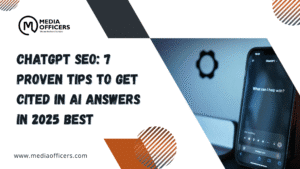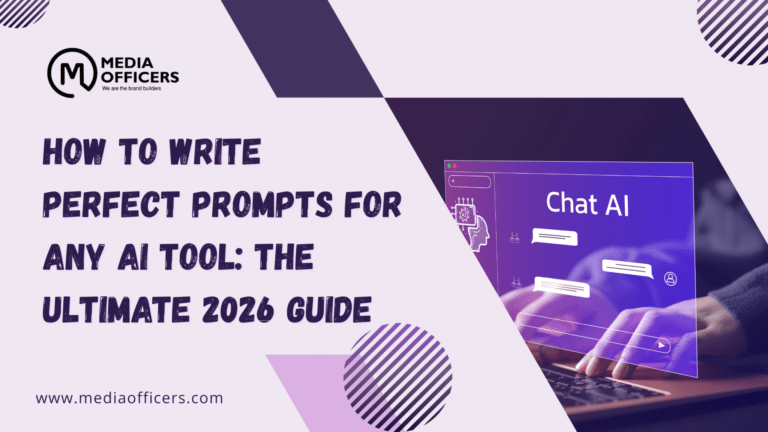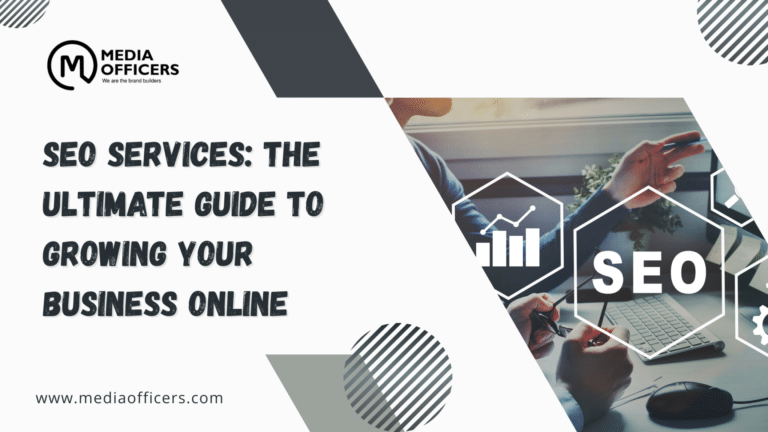ChatGPT SEO is the practice of aligning your website with how AI models source information for answers. If your goal is to earn citations in AI answers, you must ensure your site is crawlable, your pages are well-structured, and your content stays up to date. In this guide, you’ll learn a clear, implementable path to become a trusted source that artificial intelligence can reference when responding to user questions. This is not about gaming algorithms; it’s about building real authority that stands the test of evolving AI systems.
Across industries, search intent is shifting: people want fast, accurate, and credible information delivered by AI. The way to position your content for ChatGPT and similar models is to create a Google‑friendly foundation that also serves the needs of AI researchers and answer engines. The result is not just better visibility in search engines, but actual AI citations that can appear in AI‑generated responses.
What AI citations really mean for your site
When an AI like ChatGPT cites your content, it signals a level of authority and trustworthiness that can drive direct traffic, brand credibility, and industry influence. Citations aren’t guaranteed; they depend on your content quality, page structure, and how well you signal topical relevance to crawlers and AI systems. The core idea is simple: be the best, most transparent source for a given topic so AI models can find you quickly and accurately.
To achieve this, you need a comprehensive content strategy that covers topics in depth, aligns with user intent, and uses clear signals that AI systems (and humans) can interpret. In practice, this means clean site architecture, accurate metadata, structured data, and regularly updated information. It also means fostering E-E-A-T signals Expertise, Authoritativeness, and Trustworthiness while ensuring your content is accessible to crawlers and AI agents alike.
Step-by-step: How to optimize for AI citations in ChatGPT
- Make your site crawlable and easy to index. Start with a clean robots.txt file that doesn’t block important sections and submit a current sitemap to search engines. Ensure that important pages load quickly, use clean URLs, and present content in a way that’s easy for both humans and machines to parse. Use descriptive, keyword‑rich URLs that reflect the topic of the page. These foundational signals help ChatGPT SEO align your content with user questions.
- Structure content with topic clusters. Create pillar pages for broad topics and supporting cluster posts that drill into specifics. Interlink these pages with clear anchor text so both users and AI models can trace the relationships. A well‑organized site makes it easier for AI to map your expertise across related subtopics, increasing the chances of being cited for multiple queries.
- Emphasize data quality and freshness. Update statistics, replace outdated references, and add fresh analyses regularly. Dates matter: display publish and last revision dates where relevant. Demonstrate that your content reflects current knowledge, which is crucial for AI references that prioritize accuracy and timeliness.
- Leverage structured data and schema. Implement JSON‑LD for Article, FAQ, Organization, and WebPage schemas. Use BreadcrumbList to signal topic hierarchy, and consider Article‑MainEntity for core claims. Structured data helps AI systems extract key facts and tie them back to your pages.
- Cite your own credibility and external references. Where AI might cite you, back up claims with primary sources, official data, and peer‑reviewed material when applicable. Clearly attribute quotations and provide linkable sources. This not only improves human comprehension but also strengthens the trust signal AI models rely on.
- Optimize on-page signals and semantics. Use descriptive headings (H2, H3) that reflect search intent, and include a few well‑placed secondary keywords as natural variations (LSI terms) such as AI citations, crawling and indexing, knowledge base, and schema markup. Maintain a healthy keyword density for ChatGPT SEO without keyword stuffing.
- Monitor, measure, and iterate. Track how often your content appears in AI responses and monitor traffic and engagement from those occurrences. Use analytics to identify gaps, update underperforming pages, and expand topical coverage that AI might reference. Continuous improvement is a core element of sustainable ChatGPT SEO success.
Key on-page elements that boost AI citations
There are several specific on-page elements that can improve your compatibility with AI answer generation. Consider these practical tactics to reinforce the signals that matter for ChatGPT SEO:
- Clear, concise definitions for key terms around your topic help AI models extract precise answers. Consider a glossary section with machine‑readable definitions that AI can reference directly.
- Author bios and expertise signals on each article establish credibility. Include credentials, affiliations, and publication history to strengthen trust signals.
- FAQ sections with structured questions and short, direct answers. FAQ pages often become the preferred source for AI snippets, so design them with AI extraction in mind.
- Data tables and visual assets (images, charts, graphs) with descriptive alt text. If an AI model references numerical data, well‑labeled visuals can improve accuracy and citation chances.
- Internal linking that signals topic authority. Link from broad to niche pages and back, creating a web of interconnected expertise that AI can traverse to reach your brand.
Creating credible, AI-friendly content
Credibility is not only about trust; it’s about being the reliable source that AI models can cite consistently. Achieve this by combining depth, accuracy, and transparency. Publish in‑depth guides, case studies, and data analyses with transparent methodologies and sources. When a model needs to answer a user question such as “How does X affect Y?” your thorough, well‑documented content should be the go‑to reference.
Additionally, cultivate a robust knowledge base that owners or teams can reference. A centralized hub of core facts, data points, and policy summaries makes it easier for AI to draw from a single, authoritative source. The more cohesive and interlinked your site is, the more likely AI systems feel confident citing you as a primary reference for related inquiries.
Advanced techniques: technical SEO for AI alignment
Beyond the basics, there are technical upgrades that can further align your site with how AI answers are formed. Consider these advanced tactics:
- Accessibility and performance: optimize Core Web Vitals, reduce server response times, and ensure mobile accessibility. AI models often prioritize content that loads quickly and is easy to parse on various devices.
- Structured navigation: implement a predictable, crawlable menu structure and XML sitemap index pages. AI benefits from clear hierarchical signals that map to your topic authority.
- Versioned content and changelogs: maintain a public changelog for major updates. AI models appreciate visibility into how content evolves, which can improve long‑term citation stability.
- Safe, transparent linking policy: avoid excessive redirects and broken links. Persistent, well‑maintained links boost trust and reduce the risk of AI citing outdated sources.
Measuring success in ChatGPT SEO
Measuring the impact of ChatGPT SEO requires a combination of traditional SEO metrics and AI‑specific indicators. Look for increases in AI‑driven impressions, more frequent citations in AI‑generated answers, and higher engagement on pages that AI references. Track metrics such as source credibility signals, time on page, and the breadth of topics covered by your content. Over time, you should see a compounding effect: as your site becomes more authoritative, AI models may cite you across a wider array of questions.
Practical checklist for ongoing optimization
- Audit crawlability and indexing: confirm no important pages are blocked, verify robots.txt, and ensure canonicalization is correct.
- Review content depth: ensure each pillar page provides comprehensive coverage with clear subtopics and updated data.
- Enhance schema usage: implement and validate JSON‑LD for articles, FAQs, and organization data.
- Refresh data and references: schedule quarterly updates for statistics, case studies, and claims.
- Strengthen external references: use high‑quality, authoritative sources and ensure they’re accessible and properly cited.
Frequently Asked Questions
What is ChatGPT SEO?
ChatGPT SEO is the practice of optimizing your website so that AI models like ChatGPT can reliably source and cite your content when answering questions. It combines traditional SEO fundamentals with strategies that improve how AI interprets and trusts your material.
How does ChatGPT decide which source to cite?
AI models consider factors like relevance, authority, content quality, structure, and accessibility. Clear topic signaling, structured data, up‑to‑date information, and transparent sourcing increase the likelihood of being cited.
Can I control which pages ChatGPT cites?
While you cannot directly command an AI to cite specific pages, you can influence outcomes by improving signal quality: publish authoritative, well‑structured content, provide explicit references, and ensure your core topics are clearly linked and easy to navigate.
How long does it take to see AI citations?
Results vary based on topic, competition, and AI model behavior. In many cases, you may begin to see improved signals within a few months of consistent optimization, with longer‑term gains as your authority grows across related topics.
Conclusion
In the evolving landscape of AI‑driven answers, ChatGPT SEO is about building a durable bedrock of crawlable, structured, and trustworthy content. By aligning your site architecture, data quality, and signaling with how AI models source information, you position your pages to be cited more often in AI responses. This isn’t a one‑time project but a sustained effort that blends technical SEO, content strategy, and ethical credibility. Start with a solid foundation crawlability, clarity, and credible sourcing and expand into structured data, topic clusters, and regular updates. Over time, you’ll not only improve traditional search visibility but also unlock meaningful AI citations that amplify your authority in the digital landscape.




